Sustaining
China's Economic Growth
After the Global Financial Crisis
Nicholas R. Lardy.

PETERSON INSTITUTE FOR INTERNATIONAL ECONOMICS
Washington, DC
January 2012
Nicholas R. Lardy , called everybody's guru on China by the National Journal , is the Anthony M. Solomon Senior Fellow at the Peterson Institute for International Economics. He joined the Institute in March 2003 from the Brookings Institution, where he was a senior fellow from 1995 until 2003. He served at the University of Washington, where he was the director of the Henry M. Jackson School of International Studies from 1991 to 1995. From 1997 through the spring of 2000, he was also the Frederick Frank Adjunct Professor of International Trade and Finance at the Yale University School of Management. He is author, coauthor, or editor of The Future of China's Exchange Rate Policy (2009), China's Rise: Challenges and Opportunities (2008), Debating China's Exchange Rate Policy (2008), and China: The Balance SheetWhat the World Needs to Know Now about the Emerging Superpower (2006). He is a member of the Council on Foreign Relations and a member of the editorial boards of the China Quarterly, China Review , and Journal of Contemporary China .
PETER G. PETERSON INSTITUTE FOR INTERNATIONAL ECONOMICS
1750 Massachusetts Avenue, NW
Washington, DC 20036-1903
(202) 328-9000 FAX: (202) 659-3225
www.piie.com
C. Fred Bergsten, Director
Edward A. Tureen, Director of Publications, Marketing, and Web Development
Typesetting by Diacritech
Printing by Versa Press, Inc
Cover design by Fletcher Design
Cover photo: Paul SoudersCorbis and Kick ImagesPhotodisc
Copyright 2012 by the Peter G. Peterson Institute for International Economics. All rights reserved. No part of this book may be reproduced or utilized in any form or by any means, electronic or mechanical, including photocopying, recording, or by information storage or retrieval system, without permission from the Institute.
For reprints/permission to photocopy please contact the APS customer service department at Copyright Clearance Center, Inc., 222 Rosewood Drive, Danvers, MA 01923; or email requests to: info@copyright.com
Printed in the United States of America
14 13 12 5 4 3 2 1
Library of Congress Cataloging-in-Publication Data
Lardy, Nicholas R.
Sustaining China's economic growth after the global financial crisis / Nicholas R. Lardy.
p. cm.
Includes bibliographical references.
ISBN 978-0-88132-626-0
1. China--Economic policy--2000- 2. China--Economic conditions--2000- 3. Global Financial Crisis, 2008-2009. I. Title.
HC427.95.L37 2012
338.951--dc23
2011043034
The views expressed in this publication are those of the author. This publication is part of the overall program of the Institute, as endorsed by its Board of Directors, but does not necessarily reflect the views of individual members of the Board or the Advisory Committee.
PETER G. PETERSON INSTITUTE FOR INTERNATIONAL ECONOMICS
1750 Massachusetts Avenue, NW, Washington, DC 20036-1903
(202) 328-9000 Fax: (202) 659-3225
C. Fred Bergsten, Director
BOARD OF DIRECTORS
Peter G. Peterson, Chairman
George David, Vice Chairman
James W. Owens, Chairman ,
Executive Committee
Leszek Balcerowicz
Ronnie C. Chan
Chen Yuan
Andreas C. Dracopoulos
Jessica Einhorn
Mohamed A. El-Erian
Stanley Fischer
Jacob A. Frenkel
Maurice R. Greenberg
Herbjorn Hansson
Tony Hayward
Carla A. Hills
Karen Katen
W. M. Keck II
Michael Klein
Caio Koch-Weser
Lee Kuan Yew
Reynold Levy
Andrew N. Liveris
Sergio Marchionne
Donald F. McHenry
Indra K. Nooyi
Paul O'Neill
David J. O'Reilly
Hutham Olayan
Samuel J. Palmisano
Frank H. Pearl
Michael A. Peterson
Victor Pinchuk
Joseph E. Robert, Jr.
Lynn Forester de Rothschild
Richard E. Salomon
Sheikh Hamad Saud Al-Sayari
Edward W. Scott, Jr.
Frederick W. Smith
Lawrence H. Summers
Jean-Claude Trichet
Laura D'Andrea Tyson
Paul A. Volcker
Peter Voser
Jacob Wallenberg
Marina v.N. Whitman
Ronald A. Williams
Ernesto Zedillo
Ex officio
C. Fred Bergsten
Nancy Birdsall
Richard N. Cooper
Barry Eichengreen
Honorary Directors
Alan Greenspan
Frank E. Loy
David Rockefeller
George P. Shultz
ADVISORY COMMITTEE
Barry Eichengreen, Chairman
Richard Baldwin, Vice Chairman
Kristin Forbes, Vice Chairwoman
Isher Judge Ahluwalia
Robert E. Baldwin
Steve Beckman
Olivier Blanchard
Barry P. Bosworth
Menzie Chinn
Susan M. Collins
Wendy Dobson
Jeffrey A. Frankel
Daniel Gros
Sergei Guriev
Stephan Haggard
Gordon H. Hanson
Takatoshi Ito
John Jackson
Peter B. Kenen
Anne O. Krueger
Paul R. Krugman
Justin Yifu Lin
Jessica T. Mathews
Rachel McCulloch
Thierry de Montbrial
Sylvia Ostry
Jean Pisani-Ferry
Eswar S. Prasad
Raghuram Rajan
Changyong Rhee
Kenneth S. Rogoff
Andrew K. Rose
Fabrizio Saccomanni
Jeffrey D. Sachs
Nicholas H. Stern
Joseph E. Stiglitz
William White
Alan Wm. Wolff
Daniel Yergin
Richard N. Cooper,
Chairman Emeritus
* Member of the Executive Committee
Acknowledgments
This volume could not have been completed without the support of many individuals. My greatest debt is to Patrick Douglass and Nicholas Borst, research analysts who made it possible for me to keep up with the large flow of primary source material on which the volume draws heavily. I am also indebted to participants in a study group that met to critique a draft of the manuscript in mid-year 2011. This group included Vivek Arora, C. Fred Bergsten, Anders  slund, Nigel Chalk, William Cline, Robert Dohner, Steven Dunaway, Nicolas Ericsson, Morris Goldstein, Yukon Huang, Albert Keidel, Kenneth Lieberthal, David Loevinger, Daniel Rosen, Nicolas Vron, John Williamson, Christopher Winship, and Zhu Min. Dwight Perkins and an anonymous reviewer critiqued the final manuscript. Others who offered useful written comments at various stages include Joseph Gagnon, Robert Lawrence, and Paul Vandenberg. Jin Mei of the Monetary Policy Department of the People's Bank of China clarified the scope of some of the data reported in the bank's quarterly Monetary Policy Reports , one of the most important primary sources on the Chinese economy.
slund, Nigel Chalk, William Cline, Robert Dohner, Steven Dunaway, Nicolas Ericsson, Morris Goldstein, Yukon Huang, Albert Keidel, Kenneth Lieberthal, David Loevinger, Daniel Rosen, Nicolas Vron, John Williamson, Christopher Winship, and Zhu Min. Dwight Perkins and an anonymous reviewer critiqued the final manuscript. Others who offered useful written comments at various stages include Joseph Gagnon, Robert Lawrence, and Paul Vandenberg. Jin Mei of the Monetary Policy Department of the People's Bank of China clarified the scope of some of the data reported in the bank's quarterly Monetary Policy Reports , one of the most important primary sources on the Chinese economy.
I also benefited from the opportunity to present the findings of the study to audiences at the Peterson Institute for International Economics, the Brookings Institution, Stanford University, the University of Toronto, the International Monetary Fund, at a conference in Beijing organized by the Asian Development Bank and the Chinese Ministry of Finance, and at two meetings of a Track II Economic Dialogue organized by the National Committee on US-China Relations and the Beijing University China Center for Economic Research. Comments and feedback from these sessions led to numerous refinements in the analysis in the book.
A special thanks to C. Fred Bergsten, the director of the Peterson Institute, who has consistently been a strong supporter of the Institute's work on China, including this study. The publications department at the Peterson Institute, led by Ed Tureen, transformed the manuscript into the final printed form in an expeditious manner. I particularly thank Susann Luetjen and Madona Devasahayam, who were responsible, respectively, for production and design coordination and managing the editing.
Next page
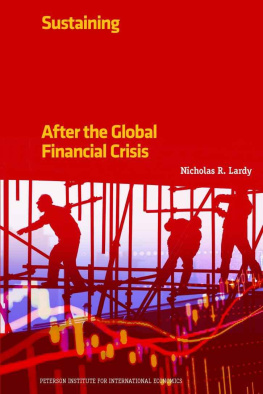
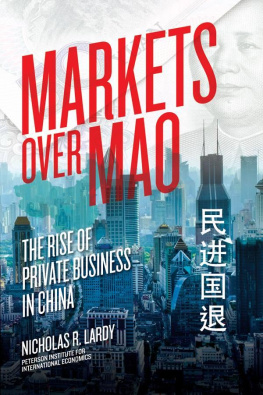

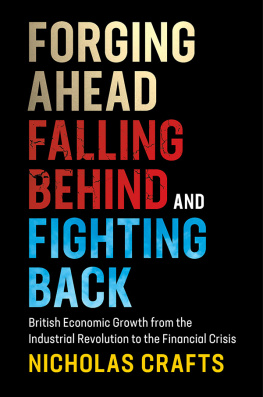
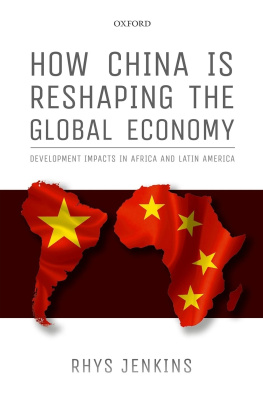
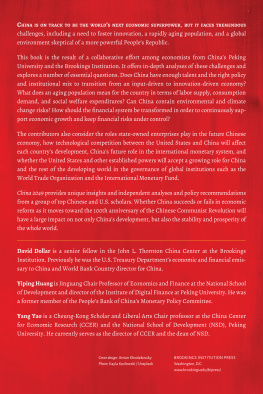
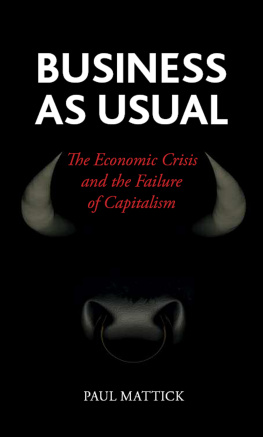
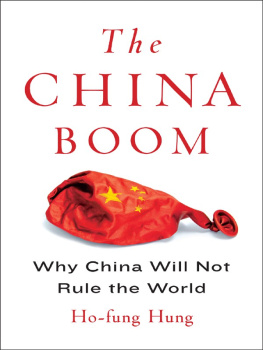
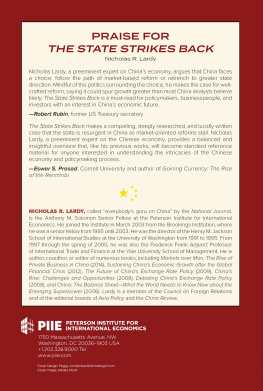

 slund, Nigel Chalk, William Cline, Robert Dohner, Steven Dunaway, Nicolas Ericsson, Morris Goldstein, Yukon Huang, Albert Keidel, Kenneth Lieberthal, David Loevinger, Daniel Rosen, Nicolas Vron, John Williamson, Christopher Winship, and Zhu Min. Dwight Perkins and an anonymous reviewer critiqued the final manuscript. Others who offered useful written comments at various stages include Joseph Gagnon, Robert Lawrence, and Paul Vandenberg. Jin Mei of the Monetary Policy Department of the People's Bank of China clarified the scope of some of the data reported in the bank's quarterly Monetary Policy Reports , one of the most important primary sources on the Chinese economy.
slund, Nigel Chalk, William Cline, Robert Dohner, Steven Dunaway, Nicolas Ericsson, Morris Goldstein, Yukon Huang, Albert Keidel, Kenneth Lieberthal, David Loevinger, Daniel Rosen, Nicolas Vron, John Williamson, Christopher Winship, and Zhu Min. Dwight Perkins and an anonymous reviewer critiqued the final manuscript. Others who offered useful written comments at various stages include Joseph Gagnon, Robert Lawrence, and Paul Vandenberg. Jin Mei of the Monetary Policy Department of the People's Bank of China clarified the scope of some of the data reported in the bank's quarterly Monetary Policy Reports , one of the most important primary sources on the Chinese economy.